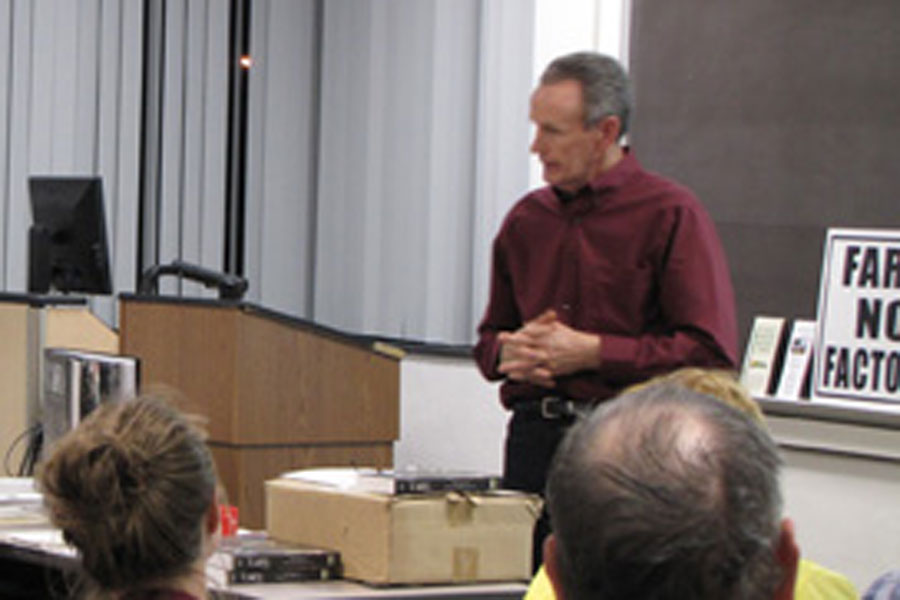

Venture Boldly

Adriana Colindres
Features Editor
2 East South Street
Galesburg, IL 61401


Article by Laura Pochodylo '14
Photography by Hongyu "Sophie" Zhou '14
Environmental and public health activists Karen Hudson and Terry Spence brought "food for thought" to Knox College in their March 27 presentation on industrial meat production.
Hudson opened with a discussion titled, "Go Beyond the Burger: Discover the Hidden Costs of Industrial Meat Production," which examined common misconceptions about where our food comes from as well as the hazardous effects that factory farming has on rural communities.
Hudson, a farmer from Elmwood, Illinois, is nationally known for her advocacy work. She consults with the Socially Responsible Agricultural Project and serves as president of Illinois Citizens for Clean Air and Water.
Knox post-baccalaureate fellow Helen Schnoes '11 spearheaded the effort to bring Hudson and Spence to campus. Schnoes is working to raise awareness and promote change concerning food and sustainability. For example, she has collaborated with Knox Dining Services Director Helmut Mayer to launch "Local Burger Nights," which feature hamburgers made from beef that is produced locally and sustainably. She also is serving as research assistant to Visiting Assistant Professor of Environmental Studies Nic Mink, who is writing a book, Salmon: A Global History.
The Post-Baccalaureate Fellowship program is designed to provide a special opportunity for a limited number of Knox students to complete additional academic work immediately after graduation, combined with a project that helps strengthen the educational programs of the College.
Schnoes became aware of Hudson through a speech that Hudson gave at the 2011 TEDxManhattan conference. Upon learning that Hudson lived nearby, Schnoes invited her to campus.
"I wanted to (invite) them because the issues they face and the work they do are vitally important," Schnoes said. "The larger food movement -- whether concerned with food safety, local foods, consolidation of our food supply and production, or environmental impacts of industrial production -- transcends individual fields of study."
Standing in front of a sign that read, "Illinois: Land of Stinkin'," Hudson showed images of factory farms in Knox County and explained her experiences with grassroots activism.
"I've been called a ‘terrorist,' but I just want clean air and water, and humane treatment of animals," Hudson said. "Being grassroots is not being a terrorist -- being grassroots is doing the right thing."

She went on to show photos of large-scale livestock facilities and discussed how the odors and waste they generate can contaminate the air and water, leading to public health problems.
Spence, a livestock farmer from Missouri, echoed Hudson's sentiments in his portion of the presentation, titled "Integrity of Our Food Supply." He discussed the future of sustainable agriculture and how factory farms affect independent farms and entire rural communities. He is co-founder of Family Farms for the Future and CLEAN (Citizens Legal Environmental Action Network), a group focusing on air-quality concerns and other problems related to the large-scale facilities.
"Sustainability is the backbone of this country," Spence said.
Spence also noted the high turnout at the event, which attracted a capacity crowd in the Francois Classroom.
"It warms my heart to see the young generation out," Spence said. "You're the future of sustainability."
Schnoes credited that turnout to the nature of the topic of factory farms.
"It's an issue that so readily relates to so many different academic areas and personal interests. These are things that are highly topical and highly relevant right now," she said. "I think more people are waking up."
Published on April 04, 2012